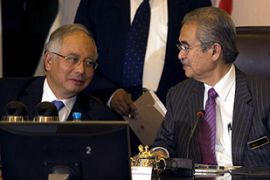Malaysia PM to step down
March date comes in wake of party dissent following polls setback and opposition threats.

Racial tensions are also running high and the country is suffering massive inflation and bracing itself for the impact of a global economic meltdown.
Speaking to reporters on Wednesday, Abdullah said he would not defend his post as president of Umno when party elections are held in March.
| Profile | ||
|
|
The move is widely seen as an attempt to avert an open rebellion from party members who have been calling for his resignation since the 13-party ruling Barisan Nasional coalition put on a dismal performance in the March 8 general elections.
Abdullah, who admitted that he was leaving earlier than planned to prevent a split in the party, has nominated his deputy, Najib Abdul Razak, to assume his party and government duties once the transition of power is complete.
By convention, the leader of Umno becomes the country’s prime minister and chairman of BN, which has been in power since Malaysia gained independence from British rule in 1957.
‘It’s time’
“I know that I was not doing well enough during the [March] election so it’s time for someone else to take over,” Abdullah, 68, said when asked whether he was forced out of office.
“In all my years of service, I have always been guided by my conscience … and I do not want a divided party and governing coalition, but one that is united and harmonious.”
|
“I wish to hand to my successor a country that is capable of confronting any global economic challenges” Abdullah Ahmad Badawi, Malaysian PM |
Abdullah, however, said he would enact laws to clean up judicial appointments and deal with corruption in his remaining six months in office.
Abdullah, who took office in 2003, initially refused to resign before agreeing to go early in 2010 and then finally settling on the March 2009 date when the earlier plan failed to placate dissidents.
Abdullah secured an overwhelming victory in a 2004 general election after succeeding Mahathir Mohamad in 2003.
But his popularity waned amid claims that he had failed to tackle cronyism and corruption, issues on which he had campaigned.
Abdullah, who was also finance minister until recently handing over the post to his deputy, Najib, said he had “no regrets” that his reform programme had made little headway during his years in office.
“I wish to hand to my successor a country that is capable of confronting any global economic challenges,” he said.
Analysts say Abdullah’s successor, Najib, 55, would have a hard time trying to unite the BN coalition and thwart the opposition’s bid to take power.
“Najib lacks the imagination and the drive to make Umno a ‘sexy’ party,” Ooi Kee Beng, a Malaysia expert at the Institute of South East Asian Studies in Singapore, said.
“The same goes for most Umno leaders today. None is convincing as a force for the future.”
